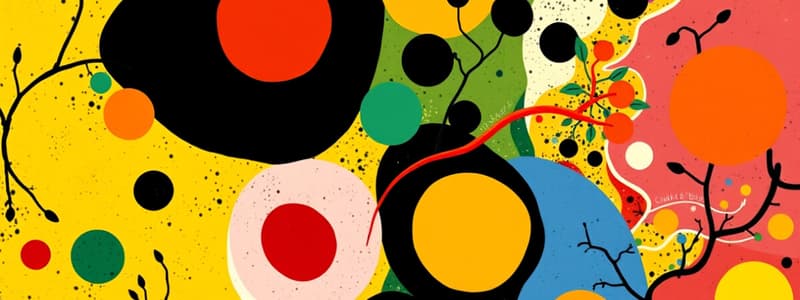Podcast
Questions and Answers
What is the primary structural and functional unit of life?
What is the primary structural and functional unit of life?
- Organ
- Cell (correct)
- Tissue
- Organism
Which property of life allows organisms to maintain a stable internal environment?
Which property of life allows organisms to maintain a stable internal environment?
- Reproduction
- Growth and development
- Regulation (correct)
- Order
What controls the pattern of growth and development in organisms?
What controls the pattern of growth and development in organisms?
- Cellular respiration
- Environmental stimuli
- Inherited information in DNA (correct)
- Nutrient absorption
Which characteristic is NOT associated with life?
Which characteristic is NOT associated with life?
Which example illustrates an organism's response to environmental stimuli?
Which example illustrates an organism's response to environmental stimuli?
Which type of organism far outnumbers multicellular organisms on Earth?
Which type of organism far outnumbers multicellular organisms on Earth?
How can life be primarily defined?
How can life be primarily defined?
What is the significance of reproduction in organisms?
What is the significance of reproduction in organisms?
Flashcards are hidden until you start studying
Study Notes
Definition of Biology
- Biology is the scientific study of life, encompassing diverse forms and phenomena.
- Life is commonly recognized through observable actions of living entities, distinguishing them from inanimate objects.
Characteristics of Living Things
- All organisms, regardless of type, are composed of cells, which are the fundamental units of life.
- Life manifests at the cellular level, where a cell can maintain internal balance, utilize energy, and respond to environmental changes.
Cellular Functionality
- Cells have the ability to reproduce, facilitating growth and repair in multicellular organisms.
- Single-celled organisms, such as bacteria, vastly outnumber multicellular organisms on the planet.
Major Properties of Life
- Reproduction: Organisms reproduce to create new members of their kind.
- Order: Life is characterized by complex and ordered structures.
- Response to Environment: Organisms react to environmental stimuli, exemplified by a Venus flytrap's rapid closure upon sensing a fly.
- Regulation: Organisms possess mechanisms to maintain favorable internal conditions; for example, lizards basking in the sun to regulate body temperature.
- Growth and Development: DNA contains genetic information that directs the growth and development patterns of all organisms.
- Energy Processing: Living organisms absorb energy and convert it to sustain their activities.
- Evolutionary Adaptation: Traits that enhance survival and reproduction evolve over generations, such as the red panda's warm tail for insulation.
Diversity of Life
- The living world exhibits extraordinary diversity, prompting biologists to categorize and study this variety for better understanding.
Studying That Suits You
Use AI to generate personalized quizzes and flashcards to suit your learning preferences.




